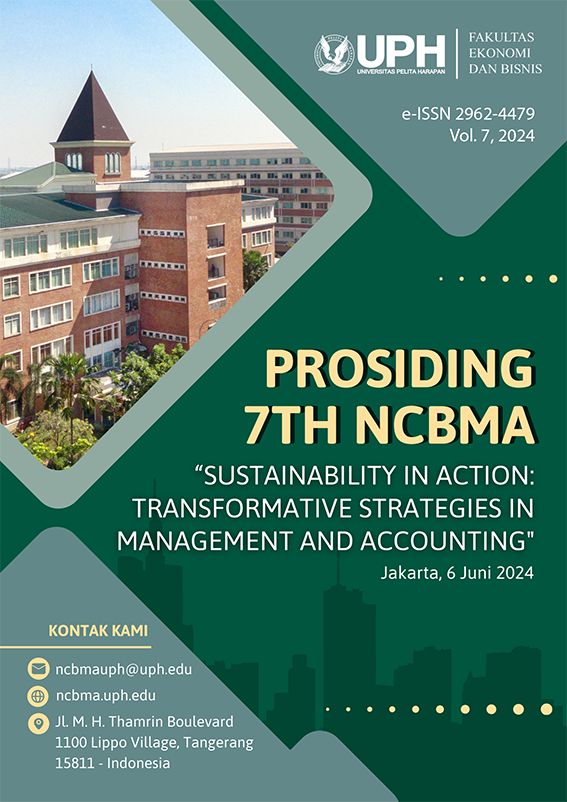EXPLORING THE IMPACT OF LEADERSHIP STRATEGIES ON CORPORATE SUSTAINABILITY: INSIGHTS FROM PROFITABILITY, ETHICAL GOVERNANCE, AND LONG-TERM VALUE CREATION
Keywords:
Leadership Strategies, Corporate Sustainability, Qualitative ExplorationAbstract
This study aims to explores the impact of leadership strategies on corporate sustainability, focusing on profitability, ethical governcance, and long-term value creation. The study population consists of individuals occupying leadership positions in various corporation. The purposive sampling technique is used to select participants with extensive and insights into the interaction between leadership strategies and corporate sustainability. Data analysis involves thematic analysis to identify patterns, themes, and meaning within textual data. Through in-dept interviews, several key themes emerged, elucidating how leadership strategies influence corporate sustainability dimensions. Ethical leadership, strategic alignment of financial and sustainability goals, effective corporate governance, and transparent communication were identified as key drivers of sustainable business practices. Findings underscore the imperative for organizational to adopt a holistic apporoach to business, integrating sustainability principles into their core values and strategic decision-making process. By embracing these principles, organizations can enhance their long-term resilience, competitiveness, and contribution to society and the environment.
References
Adams, C. A., & Muir, S. (2014). Measurement of sustainability performance in the public sector. Sustainability Accounting, Management and Policy Journal, 5(1), 46-67. https://doi.org/10.1108/SAMPJ-04-2012-0018
Aguinis, H. (2012). What We Know and Don ’ t Know About Corporate Social Responsibility : A Review and Research Agenda. Journal of Management, 38(4). https://doi.org/10.1177/0149206311436079
Avolio, B. J., & Gardner, W. L. (2005). Authentic leadership development : Getting to the root of positive forms of leadership. The Leadership Quarterly, 16, 315-338. https://doi.org/10.1016/j.leaqua.2005.03.001
Bass, B. M. (1990). From transactional to transformational leadership: Learning to share the vision. Organizational Dynamics, 18(3), 19-31.
Braun, V., & Clarke, V. (2006). Using thematic analysis in psychology. Qualitative Research in Psychology, 3(2), 77-101.
Brown, M. E., & Treviño, L. K. (2006). Ethical leadership : A review and future directions. The Leadership Quarterly, 17, 595-616. https://doi.org/10.1016/j.leaqua.2006.10.004
Chris A. Mallin. (2013). Corporate Governance. Oxford University Press.
Eccles, R. G., Ioannou, I., & Serafeim, G. (2014). The Impact of Corporate Sustainability on Organizational Processes and Performance. SSRN Electronic Journal (Management Science), 60(11), 2835-2857. https://doi.org/http://dx.doi.org/10.2139/ssrn.1964011
Eisenhardt, K. M., & Graebner, M. E. (2007). Theory Building from Cases : Opportunities and Challenges. Academy of Management Jo, 50(1), 25-32.
Elkington, J. (1998). Partnerships from Cannibals with Forks : The Triple iottom line of 2 1 st = Century Business. In Environmental Quality Managemen (pp. 37-51). John Wilye & Sons,inc.
Gompers, Ishii, P. A. and, Metrick, J. L. and, & Andrew. (2003). Corporate governance and equity prices. Quarterly Journal of Economics, 118(February), 107-155. https://doi.org/http://dx.doi.org/10.2139/ssrn.278920
Hart, S. L., & Hart, S. L. (1995). A Natural-Resource-Based View of the Firm. Academy of Management Review, 20(4), 986-1014.
K.Denzin, N., & S.Linconln, Y. (2018). Sage Handbook of Qualitative Research (5 th. edit). SAGE.
Kramer, M. R., & Porter, M. E. (2011). Creating Shared Value. Harvard Business Review, February.
Kusnanto, E. (2022). Performance Measurement Based on Balance Scorecard Perspective of Sustainable Leadership, Corporate Governance and Human Capital in Banking Industry. International Journal of Contemporary Accounting, 4(1), 41-58. https://doi.org/10.25105/ijca.v4i1.13916
Patton, M. Q. (2015). Qualitative Research & Evaluation Methods (4 th Editi). Sage Publication,Inc.
Schaltegger, S. (2002). Contemporary Environmental Accounting: Issues, Concepts and Practice. Corporate Social Responsibility and Environmental Management, 9, 81-82. https://doi.org/10.1108/ijshe.2001.2.3.288.1
Solomon, J., & Solomon, A. (2004). Corporate Governance and Accountability. John Wiley and Sons Ltd.
Tricker, B. (2015). Corporate Governance : Principles, Policies, And Practices (3 th.ed). Oxford University Press.
W.Creswell, J., & Creswell, J. D. (2018). Research Design: Qualitative, quantitative, and mixed methods approaches (5 th Editi).
Waldman, D. A., Bass, B. M., & Yammarino, F. J. (1990). Adding to Contingent-Reward Behavior The Augmenting Effect of Charismatic Leadership. In Group & Organization Studies (Vol. 15, Issue 4, pp. 381-394). Sage Publication,Inc.
Yukl, G. (2011). Leadership in Organizations (8th ed.). Pearson.
Downloads
Published
Issue
Section
License
Copyright (c) 2024 Ruslaini Ruslaini, Benardi Benardi, Rendy Agustinus

This work is licensed under a Creative Commons Attribution-ShareAlike 4.0 International License.

